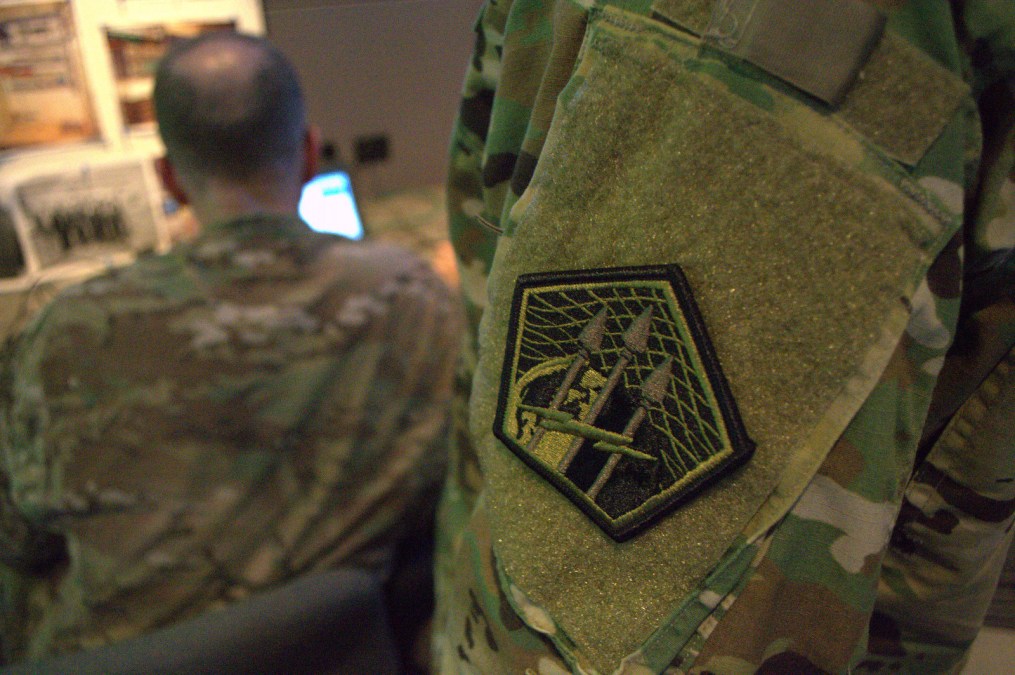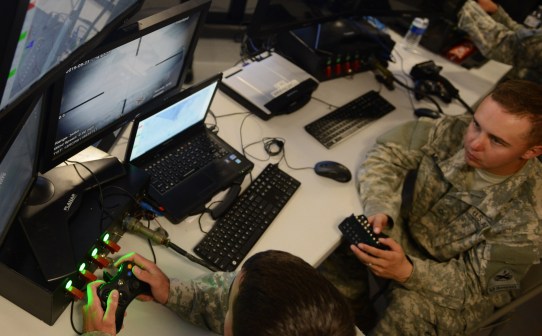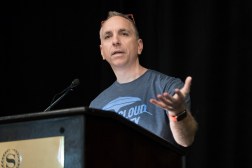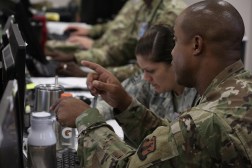Defense Digital Service redesigns Army Cyber Command training

The Defense Digital Service has cut down the training time for Army cyber-operations specialists from six months to just 12 weeks in a new pilot project, helping the Army Cyber Command boost its pipeline of talent.
DDS, known for trying to get the military to think differently about building and buying technology, worked with the Army Cyber School and the training company General Assembly to rethink the curriculum, condensing the material down and graduating specialists in about half the time.
The initial pilot’s 10 students, who graduated in April, performed on par with those who took the traditional course, said Lilly Madigan, a user experience designer for DDS.
While DDS isn’t necessarily dedicated to the world of training and education, it is interested in getting the best technical people to work on the military’s hard technical challenges, said Director Chris Lynch.
“And it all starts, at least on the military side, with the training that we provide to them,” Lynch told FedScoop.
The pilot project, which DDS named “Jyn 3,” is part of a larger portfolio of projects the group calls the Jyn Erso Program — a reference to the hero in the movie “Rogue One: A Star Wars Story.” It tries to get at, Lynch said, “how do we do a better job of recruiting, training, deploying and retaining exceptional talent” for Army Cyber Command. The pilot’s goal is to “remove as many of the barriers that we possibly can,” he said.
It all started when Army Cyber Command’s executive director of talent management, Nicole Camarillo, reached out to DDS to figure out how the group was recruiting top technical talent — typically with lower pay than those workers would get in the private sector. “And we started talking more about the challenges inherent in the military to retaining technical talent in uniform,” Camarillo said.
Eventually their discussions, as well as conversations with soldiers in technical roles, led development of the project Jyn 1, which focused on brining a small team of tech-savvy soldiers to work alongside DDS engineers to develop a counter-drone capability, Camarillo said. The teams got approval from then-Army Cyber Commander Gen. Paul Nakasone — now the head of U.S. Cyber Command and director of the National Security Agency — to build a team to work for two-to-three months on a problem.
“We were really trying to show if we managed them in an incubator environment like they would be managed in the private sector, would they be able to do more?” Camarillo said.
In the initial focus groups with soldiers, they highlighted issues like the time it takes them to get “hands on keyboard,” Camarillo said. They also discussed the need for training opportunities to develop their skills.
Since Jyn 1, two other teams have worked with DDS to develop capabilities, Camarillo said, and the program is spinning up another now.
And then there’s the training pilot, Jyn 3, which started Jan. 8 and concluded April 20, when the 10 soldiers graduated in a ceremony at Fort Gordon in Georgia, the location of Army Cyber Command’s headquarters.
Shaping a course, finding a partner
The prior six-month course was designed to meet the needs of “all cyber forces” throughout the U.S. military, said Dan Lim, the technical lead for Jyn 3 and a first lieutenant with the Army Cyber Command. “So there’s a bunch of material in there that is not necessarily pertinent to the way Army Cyber conducts operations, or the way that we hope to run our education pipeline.”
The goal of that original course was to give soldiers the equivalent of a college first-year survey course, Lim said — a “beginner-to-intermediate level familiarity” with basic cybersecurity fundamentals, networking and an understanding of Linux systems, Windows systems and so on. “So everything ranging from how to configure your firewall properly to how to deal with social engineering, for example,” he said.
DDS brought to the table a way to quickly implement a contract with a vendor that teaches courses in cybersecurity in the private sphere, DDS Project Manager Clair Koroma told FedScoop.
“The other thing we looked for were companies who used people who were actual practitioners of the craft that they were teaching, so that these weren’t professional training companies that just used people who taught, but people who had operational experience in the subject matter areas that we were looking for these courses,” Koroma said.
General Assembly fit the bill, Koroma said.
“The status quo for training in cyber was a one-size-fits-all approach, with a strong academic leaning, but it lagged developments in the field,” General Assembly’s Enterprise Account Director Rebecca Allyn said in an emailed statement. “What General Assembly did, in partnership with DDS and the Cyber School … was create from the ground-up an up-to-the-minute cyber security curriculum designed to impart the skills and knowledge needed for students to make more meaningful contributions to offensive and defensive cyber security and strategy.”
While designing the course, Koroma said, the team made sure it was asking for a “modular” course so it would be easier to update as technologies change.
To be sure though, Lim noted, the majority of the material was focused on fundamentals of computer science and engineering, which are more lasting than technology at the cutting edge.
The new 12 week-curriculum proved to the team that it could condense the course, Koroma said, as well as that it could bring in a vendor to work with Army Cyber Command to create a curriculum “that made sense for them.”
“But the curriculum is not complete,” she said. “We still have to fine tune it, iterate on it and rebuild it, and so we are in the phase right now of figuring out what we will do next in terms of all the lessons learned from the pilot.”
Looking inside
One of the big lessons learned for DDS: the importance of incorporating the Army Cyber Command’s in-house talent, Koroma said.
“We came in with a theory that we would bring in this vendor who was really, really well-versed in the cybersecurity space for private industry, and we’d bring them in to work with our team and Army Cyber,” Koroma said. “And that we would successfully create a training … model and we would have them implement it and it would give us sort of this magic formula.”
What the team didn’t realize was that it could use soldiers to help implement and possibly even design the curriculum, Koroma said. The team eventually saw areas where having a soldier with operational experience in the classroom really benefited students, she said.
“One thing we definitely would do differently, depending on what we decide to do, if we decide to do something more with this pilot, is to use and leverage soldiers to help teach the class,” Koroma said.
The original hypothesis was that private industry would drive tying the coursework back to the real world, Madigan said.
“And there were a couple of instances where it happened,” Madigan said. “But the majority came from those officers who were in the classroom for a completely different reason, but who were able to talk honestly and openly about the things that they’ve done, the things that they’ve seen, why they’re still in, what the students can look forward to.”
In her interviews with the students, that’s what stood out as the big takeaway, said Madigan, who did the user experience research on the pilot. Trainees got two questionnaires, at the beginning and end, and also participated in two interviews.
The pilot wasn’t without bumps in the road. The DDS team went to Georgia regularly toward the end of the course to see how the students were doing, Koroma said. Members found the students weren’t getting “some key bits of information and some key instruction.” So, Lim and two other soldiers stepped in and started coming to the classroom to supplement the instruction, she explained.
“That, we found, is something that we didn’t anticipate as a need or something that would be as valuable as it was. But it turned out to be some of the most valuable instructional experiences that the students had,” Koroma said.
Now that Jyn 3 has come to a close, DDS is trying to figure out ways to start to grow the scope of what can be achieved, Lynch said.
“We’re literally in the process of defining, if we continue with this, how do we step this up slightly so that we can take this in an even broader scope and scale across Army Cyber,” he said.






